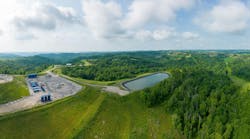CALGARY�Canada�s two largest pipeline companies have formed an agreement to work together on plans for a multibillion-dollar pipeline to move Arctic natural gas south to Canadian and US markets.
TransCanada PipeLines Ltd., Calgary, and Westcoast Energy Inc., Vancouver, are working jointly on plans for shipping gas from Alaska's Prudhoe Bay and Canada's Mackenzie Delta and Northwest Territories. The pipeline companies are studying two options: building a line directly or through their co-owned entity, Foothills Pipe Lines Ltd., Calgary, which holds a permit from US and Canadian regulators to build a line.
Foothills sponsored a project to build the Alaska Natural Gas Transportation System (ANGTS) in 1976 and won regulatory approval. Portions of the line were pre-built in Alberta and Saskatchewan in the early 1980s, but the project was never completed. If the ANGTS project were revived, the 4,800-mile line would move 2.3 bcf/day of Alaskan gas and up to 1.2 bcf/day of Mackenzie Delta gas.
Higher prices for natural gas and increasing demand in US markets have sparked renewed interest in Arctic gas supplies. TransCanada spokesman Glenn Herchak said the pipeline companies have been holding discussions with major oil companies, local governments, and aboriginal groups in the Northwest Territories on project development.
Arctic resource development
Earlier this year, Imperial Oil Ltd., Shell Canada Ltd., Gulf Canada Resources Ltd., and ExxonMobil Corp. established a joint study group to consider development of gas reserves they hold in the Mackenzie Delta. The group is studying the regulatory, financial, and social issues facing such a project.
The study is scheduled for completion by yearend.
Meanwhile, the governments of British Columbia and the Northwest Territories will complete an agreement next week to work closely together on oil and gas development. The agreement is aimed at attracting investment to northeastern British Columbia and the southwest corner of the Northwest Territories, where significant natural gas exploration and development are taking place.
The British Columbia government has already committed $103 million (Can.) for infrastructure improvements and road building in the Fort Liard, NWT, and Fort St. John, BC, areas to facilitate exploration. There have been several major natural gas discoveries in the Fort Liard region.
Alberta has had a similar agreement with the Northwest Territories government for some time.
